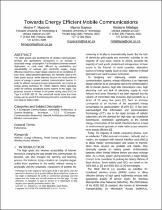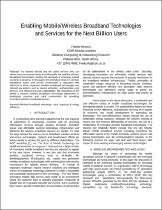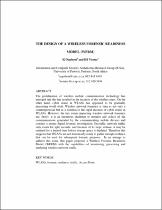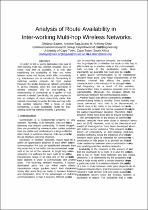JavaScript is disabled for your browser. Some features of this site may not work without it.
- ResearchSpace
- →
- Research Publications/Outputs
- →
- Conference Publications
- →
- View Item
| dc.contributor.author |
Masonta, Moshe T

|
|
| dc.contributor.author |
Mzyece, M

|
|
| dc.contributor.author |
Ntlatlapa, Ntsibane S

|
|
| dc.date.accessioned | 2011-02-04T06:47:33Z | |
| dc.date.available | 2011-02-04T06:47:33Z | |
| dc.date.issued | 2010-10 | |
| dc.identifier.citation | Masonta, MT, Mzyece, M and Ntlatlapa, N. 2010. Towards energy efficient mobile communications. 2010 Annual Research Conference of the South African Institute for Computer Scientists and Information Technologists (SAICSIT 2010), Bela Bela, South Africa, 11-13 October 2010, pp 182-187 | en_US |
| dc.identifier.isbn | 9781605589503 | |
| dc.identifier.uri | http://hdl.handle.net/10204/4824 | |
| dc.description | Annual Research Conference of the South African Institute for Computer Scientists and Information Technologists (SAICSIT 2010), Bela Bela, South Africa, 11-13 October 2010 | en_US |
| dc.description.abstract | The rapid growth and development of wireless communication services and applications corresponds to an increase in associated energy consumption. For broadband wireless network deployment in rural areas affected by unreliability and unavailability of national grid electricity supply, energy efficiency becomes a major design criterion to be considered. In such areas, diesel powered generators are normally used as the main power source, while batteries become the most preferred source of energy to power wireless communication devices. In order to address increasing energy requirements, we propose an energy saving technique for mobile stations (MSs) operating under the wireless broadband access systems in this paper. Our proposed scheme is limited to the power saving class (PSC) of Type I in IEEE 802.16. Our numerical results show that more energy can be saved if the listening interval is considered under non-sleep or awake mode. | en_US |
| dc.language.iso | en | en_US |
| dc.relation.ispartofseries | Conference paper; | |
| dc.subject | Mobile communications | en_US |
| dc.subject | Wireless communication | en_US |
| dc.subject | Broadband wireless network | en_US |
| dc.subject | Energy consumption | en_US |
| dc.subject | Energy efficiency | en_US |
| dc.subject | WiMAX | en_US |
| dc.subject | Power saving class | en_US |
| dc.subject | Broadband wireless access | en_US |
| dc.subject | Wireless | en_US |
| dc.subject | Wireless communication devices. | en_US |
| dc.subject | SAICSIT 2010 | en_US |
| dc.subject | Computer scientists | en_US |
| dc.subject | Information technologists | en_US |
| dc.title | Towards energy efficient mobile communications | en_US |
| dc.type | Conference Presentation | en_US |
| dc.identifier.apacitation | Masonta, M. T., Mzyece, M., & Ntlatlapa, N. S. (2010). Towards energy efficient mobile communications. http://hdl.handle.net/10204/4824 | en_ZA |
| dc.identifier.chicagocitation | Masonta, Moshe T, M Mzyece, and Ntsibane S Ntlatlapa. "Towards energy efficient mobile communications." (2010): http://hdl.handle.net/10204/4824 | en_ZA |
| dc.identifier.vancouvercitation | Masonta MT, Mzyece M, Ntlatlapa NS, Towards energy efficient mobile communications; 2010. http://hdl.handle.net/10204/4824 . | en_ZA |
| dc.identifier.ris | TY - Conference Presentation AU - Masonta, Moshe T AU - Mzyece, M AU - Ntlatlapa, Ntsibane S AB - The rapid growth and development of wireless communication services and applications corresponds to an increase in associated energy consumption. For broadband wireless network deployment in rural areas affected by unreliability and unavailability of national grid electricity supply, energy efficiency becomes a major design criterion to be considered. In such areas, diesel powered generators are normally used as the main power source, while batteries become the most preferred source of energy to power wireless communication devices. In order to address increasing energy requirements, we propose an energy saving technique for mobile stations (MSs) operating under the wireless broadband access systems in this paper. Our proposed scheme is limited to the power saving class (PSC) of Type I in IEEE 802.16. Our numerical results show that more energy can be saved if the listening interval is considered under non-sleep or awake mode. DA - 2010-10 DB - ResearchSpace DP - CSIR KW - Mobile communications KW - Wireless communication KW - Broadband wireless network KW - Energy consumption KW - Energy efficiency KW - WiMAX KW - Power saving class KW - Broadband wireless access KW - Wireless KW - Wireless communication devices. KW - SAICSIT 2010 KW - Computer scientists KW - Information technologists LK - https://researchspace.csir.co.za PY - 2010 SM - 9781605589503 T1 - Towards energy efficient mobile communications TI - Towards energy efficient mobile communications UR - http://hdl.handle.net/10204/4824 ER - | en_ZA |









